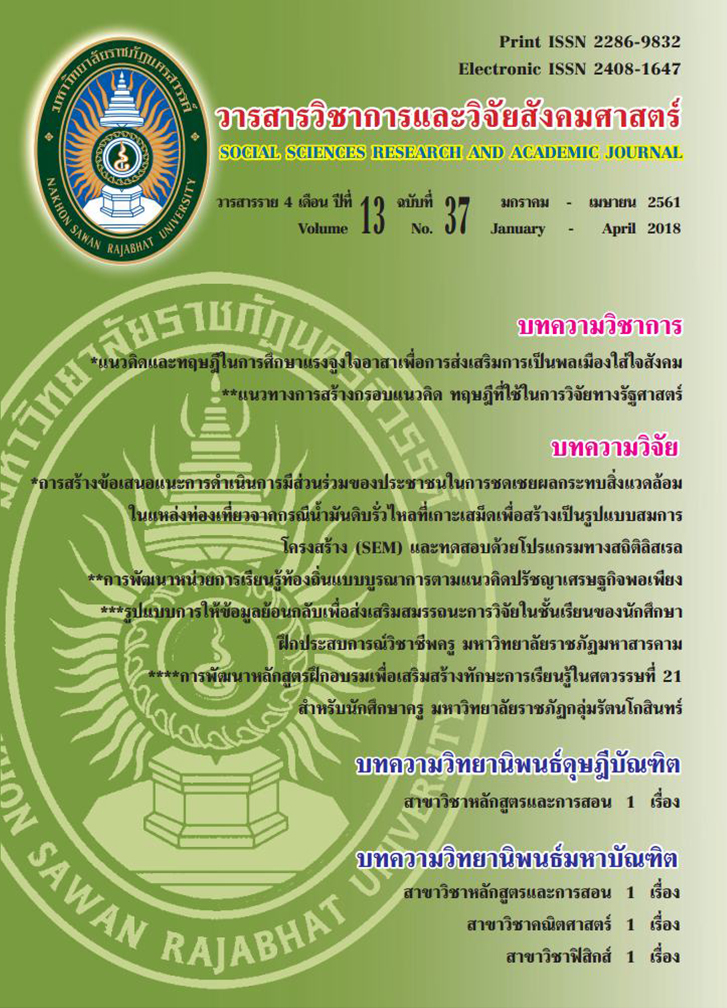แนวคิดและทฤษฎีในการศึกษาแรงจูงใจอาสาเพื่อการส่งเสริมการเป็นพลเมืองใส่ใจสังคม Concept and Theory in the Study of Volunteer Motivation to Promote Active Citizen
Main Article Content
บทคัดย่อ
แรงจูงใจอาสาได้รับความสนใจในการศึกษาวิจัยอย่างกว้างขวางเพื่อนำผลการศึกษาที่ได้มาเป็นแนวทางในการบริหารงานอาสาสมัครได้อย่างมีประสิทธิภาพ และนำการทำงานอาสาสมัครมาเป็นกลไกในการสร้างเสริมประชาชนของประเทศให้เป็นพลเมืองใส่ใจสังคม ด้วยการนำแนวคิดทฤษฎีทางจิตวิทยาและสังคมวิทยามาเป็นกรอบแนวคิดในการศึกษาวิจัยแรงจูงใจอาสา บทความนี้มีวัตถุประสงค์เพื่อนำเสนอแนวคิดทฤษฎีในการศึกษาแรงจูงใจอาสาและการนำผลจากการศึกษาแรงจูงใจอาสาไปใช้ในการบริหารจัดการงานอาสาสมัคร โดยแนวคิดทฤษฎีที่สำคัญที่ได้มีการนำมาใช้ในการทำความเข้าใจแรงจูงใจอาสาในมุมมองต่างๆ ได้แก่ 1. ทฤษฎีแรงจูงใจของแมคเคลแลนด์และแอทคินสัน 2. ทฤษฎีระบบคุณภาพชีวิตของแรงจูงใจอาสา 3. แนวคิดหน้าที่ และผลลัพธ์ที่ได้จากการศึกษาแรงจูงใจอาสาเป็นข้อมูลสำคัญในการบริหารจัดการงานอาสาสมัครในขั้นตอนต่างๆ ได้แก่ 1) การสรรหาอาสาสมัคร2) การมอบหมายงานให้กับอาสาสมัคร3) การจัดการพัฒนาและฝึกอบรมให้กับอาสาสมัคร4) การจัดให้มีระบบพี่เลี้ยงและ 5) การรักษาอาสาสมัครให้ทำงานร่วมกับองค์กรอย่างต่อเนื่อง
Concept and Theory in the Study of Volunteer Motivation to Promote Active Citizen
Abstract
Volunteer Motivation has been interested in education and research extensively. The study to be used as a guideline for volunteer management effectively. And use the volunteer work as a mechanism to enhance the people to be active citizen. By adopting the concepts and theory of psychology and sociology as a conceptual framework in the study. The objective of this review were to explore concept and theory of volunteer motivation study and approach the research result to volunteer management. McClelland and Atkinson’s Motivational Theory, The systemic quality of life of volunteer motivation and Functional Approach were presented in this article. The benefits from study volunteer motivation is efficiency volunteer management in various steps such as recruiting, placing, training, supervison and Recognition and Retention.
Article Details
เอกสารอ้างอิง
ศุภรัตน์ รัตนมุขย์. (2544). บัณฑิตอาสา: ทางเลือกของการพัฒนาจิตสำนึกทางสังคม. วารสารคณะกรรมการแห่งชาติว่าด้วยการศึกษาฯสหประชาชาติ, 33(1), 33-37.
ออมสิน จตุพร และอมรรัตน์ วัธนาธร. (2557). หลักสูตรเพื่อการรู้พลเมือง: แนวคิดการพัฒนาผู้เรียนเพื่อสร้างความเป็นพลเมืองโลกในศตวรรษที่ 21. วารสารวิชาการและวิจัยสังคมศาสตร์, 9(27), 1-14.
Clary, E. G., Snyder, M., and Ridge, R. (1992). Volunteers’ motivations: A functional strategy for the recruitment, placement, and retention of volunteers. Nonprofit Management & Leadership, 2(4), 333–350.
Clary, E. G., Snyder, M., Ridge, R. D., Copeland, J., Stukas, A. A., and Haugen, J., et al. (1998). Understanding and assessing the motivations of volunteers: A functional approach. Journal of Personality and Social Psychology. 74(6), 16-1530.
Dávila, M. C. and Chacón, F. (2007).Age and motives for volunteering: Further evidence. Europe’s Journal of Psychology, 5(2), 82-95.
Davis, M. H., Hall, J. A., and Meyer, M. (2003). The first year: Influences on the satisfaction, Involvement and persistence of new community volunteers. Personality and Social Psychology Bulletin, 29(2), 248-260.
Ferreira, M. R., Proenc¸a, T.; and Proenc¸a, J. (2012). Organisational influence on volunteer satisfaction and attitudes towards HRM practices. The case of hospital volunteers. International Review on Public and Nonprofit Marketing, 9(1), 27–42.
Finkelstein, M. A. 2007. Correlates of satisfaction in older volunteers: A motivational perspective. The International Journal of Volunteer Administration, 24(5), 6-12.
Schrock, J., and Kelsey, K. D. 2013. A phenomenological look at 4-H volunteer motives for service. Journal of Extension, 51(2), [cited 2017 Jun 2]. Available from: https://www.joe.org/joe/2013april/rb1.php
Shye, S., 2010. The Motivation to Volunteer: A Systemic Quality of Life Theory. Social Indicators Research, 98(2), 183-200.
Taylor, T. M. (2016). An Analysis of the Motivational Needs of Volunteerism Among Virginia Adult 4-H Volunteers. Journal of Research & Method in Education, 6(4), 38-40.


